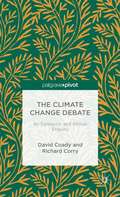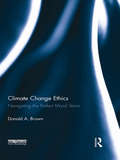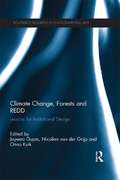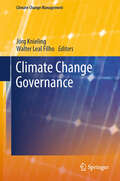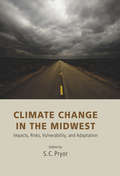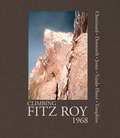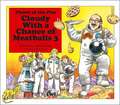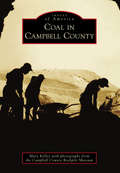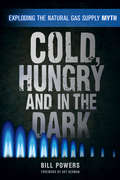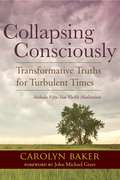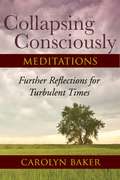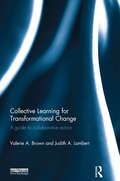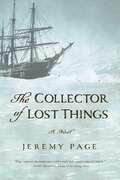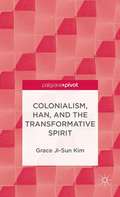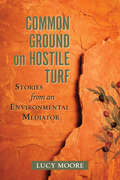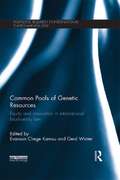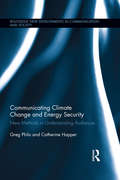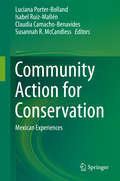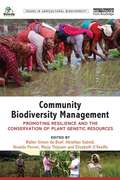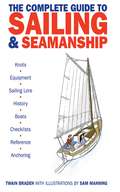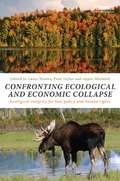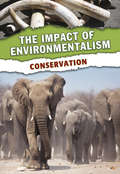- Table View
- List View
The Climate Change Debate: An Epistemic and Ethical Enquiry
by David Coady Richard CorryOf the two kinds of philosophical questions - epistemic and ethical - raised by the public debate about climate change, professional philosophers have dealt almost exclusively with the ethical. This book is the first to address both and examine the relationship between them.
Climate Change Ethics: Navigating the Perfect Moral Storm
by Donald A. BrownClimate change is now the biggest challenge faced by humanity worldwide and ethics is the crucial missing component in the debate about what to do about this enormous threat. This book examines why thirty-five years of discussion of human-induced warming has failed to acknowledge fundamental ethical concerns, and subjects climate change’s most important policy questions to ethical analysis. This book examines why ethical principles have failed to gain traction in policy formation and recommends specific strategies to ensure that climate change policies are consistent with ethical principles. Because climate change is a global problem that requires a global solution and given that many nations refuse participation due to perceived inequities in proposed international solutions, this book explains why ensuring that nations, sub-national governments, organizations, businesses and individuals acknowledge and respond to their ethical obligations is both an ethical and practical mandate. This book is the first of its kind to go beyond a mere account of relevant ethical questions to offer a pragmatic guide on how to make ethical principles influential in formulating the world’s response to climate change. Written by Donald A. Brown, a leading voice in the field, it should be of interest to policy makers, and those studying environmental policy, climate change policy, international relations, environmental ethics and philosophy.
Climate Change, Forests and REDD: Lessons for Institutional Design (Routledge Research in International Environmental Law)
by Joyeeta Gupta Nicolien van der Grijp Onno KuikA search for new methods for dealing with climate change led to the identification of forest maintenance as a potential policy option that could cost-effectively reduce greenhouse gas emissions, with the development of measures for Reducing Emissions from Deforestation and Forest Degradation (REDD). This book explores how an analysis of past forest governance patterns from the global through to the local level, can help us to build institutions which more effectively deal with forests within the climate change regime. The book assesses the options for reducing emissions from deforestation in developing countries under the international climate regime, as well as the incentives flowing from them at the national and sub national level and examines how these policy levers change human behaviour and interface with the drivers and pressures of land use change in tropical forests. The book considers the trade-offs between certain forestry related policies within the current climate regime and the larger goal of sustainable forestry. Based on an assessment of existing multi-level institutional forestry arrangements, the book questions how policy frameworks can be better designed in order to effectively and equitably govern the challenges of deforestation and land degradation under the global climate change regime. This book will be of particular interest to students and scholars of Law and Environmental Studies.
Climate Change Geoengineering
by Wil C. G. Burns Andrew L. StraussThe international community is not taking the action necessary to avert dangerous increases in greenhouse gases. Facing a potentially bleak future, the question that confronts humanity is whether the best of bad alternatives may be to counter global warming through human-engineered climate interventions. In this book, eleven prominent authorities on climate change consider the legal, policy, and philosophical issues presented by geoengineering. The book asks: When, if ever, are decisions to embark on potentially risky climate modification projects justified? If such decisions can be justified, in a world without a central governing authority, who should authorize such projects and by what moral and legal right? If states or private actors undertake geoengineering ventures absent the blessing of the international community, what recourse do the rest of us have?
Climate Change Governance (Climate Change Management)
by Walter Leal Filho Jörg KnielingClimate change is a cause for concern both globally and locally. In order for it to be tackled holistically, its governance is an important topic needing scientific and practical consideration. Climate change governance is an emerging area, and one which is closely related to state and public administrative systems and the behaviour of private actors, including the business sector, as well as the civil society and non-governmental organisations. Questions of climate change governance deal both with mitigation and adaptation whilst at the same time trying to devise effective ways of managing the consequences of these measures across the different sectors. Many books have been produced on general matters related to climate change, such as climate modelling, temperature variations, sea level rise, but, to date, very few publications have addressed the political, economic and social elements of climate change and their links with governance. This book will address this gap. Furthermore, a particular feature of this book is that it not only presents different perspectives on climate change governance, but it also introduces theoretical approaches and brings these together with practical examples which show how main principles may be implemented in practice.
Climate Change in the Midwest
by Sara C. PryorThe research presented in this volume focuses on identifying and quantifying the major vulnerabilities to climate change in the Midwestern United States. By providing state-of-the-art spatially disaggregated information regarding the historical, current, and possible future climate within the region, the contributors assess the risks and susceptibility of the critical socio-economic and environmental systems. Key sectors discussed are agriculture, human health, water, energy and infrastructure, and the vulnerabilities that may be amplified under current climate trajectories. The book also considers the challenges and opportunities to develop local and regional strategies for addressing the risks posed by climate change in the context of developing an integrative policy for the region.
Climate Change Policy in North America
by A. Neil Craik Debora Van Nijnatten Isabel StuderWhile no supranational institutions exist to govern climate change in North America, a system of cooperation among a diverse range of actors and institutions is currently emerging. Given the range of interests that influence climate policy across political boundaries, can these distinct parts be integrated into a coherent, and ultimately resilient system of regional climate cooperation?Climate Change Policy in North America is the first book to examine how cooperation respecting climate change can emerge within decentralized governance arrangements. Leading scholars from a variety of disciplines provide in-depth case studies of climate cooperation initiatives - such as emissions trading, energy cooperation, climate finance, carbon accounting and international trade - as well as analysis of the institutional, political, and economic conditions that influence climate policy integration.
Climbing Fitz Roy, 1968
by Lito Tejada-Flores Yvon Chouinard Chris Jones Dick Dorworth Doug TompkinsThis book features rare, once-thought-lost photos of the 1968 first ascent of the California Route on Cerro Fitz Roy, the third ascent of the mountain. With accompanying retrospective essays. Climbing Fitz Roy,1968, presents photo documentation of the climb, places it in the social and climbing context of the times, and reflects how this momentous trip influenced the lives of those involved, and in a greater context, the lives of so many others.
Cloudy With a Chance of Meatballs 3: Planet of the Pies
by Judi BarrettWhen astronauts land on Mars, their first discovery is a substance not unlike pie filling, and Kate and Henry are eager to go taste some, but Grandpa, who may have some inside information, discourages them.
A Clown at Midnight: Poems
by Andrew Hudgins“Recklessness and rigor, in equal measure, mark the stirring poetics of Andrew Hudgins in this fine new book. Hudgins can wrestle a rhyme scheme into submission with one hand tied behind his back and can penetrate the black heart of history with a single, subtly rendered detail. He laughs with Democritus and weeps with Heraclitus and, line by distillate line, contrives a tonic antidote to “the acetone / of American inattention.” — Linda GregersonIn A Clown at Midnight Andrew Hudgins offers a meditation on humor with a refreshing poignancy and cutting wit. He touches on love and nature, but at its core this collection is about the consolations and terrors, the delights and discomforts, of laughter, taking its title from a quote by Lon Chaney Sr.: “The essence of true horror is a clown at midnight.” Skillfully probing paradoxes, Hudgins conjures the titular clown: “Down these mean streets a bad joke walks alone / bruised head held low, chin tucked in tight, eyes down / defiant. He laughs and it turns to a moan.” Hudgins gives us utter honesty and accessible verse, exploring moments both uncomfortable and satirical while probing the impulse to confront life’s most demanding trials with laughter.“Hudgins’s poems are often funny, hinging on a joke or wisecrack or malapropism, but human nature red in tooth and claw has always been his greatest theme.” — BookPage
Coal in Campbell County (Images of America)
by Mary Kelley Campbell County Rockpile MuseumIn his Annual Report of the Territorial Geologist to the Governor of Wyoming 1890, Louis D. Ricketts wrote, "The coal of this district has little other use than that of supplying a local market." Years later, nothing could be further from the truth. The United States uses approximately one billion tons of coal a year, with about 390 million tons coming from Campbell County, Wyoming. Since large-scale commercial coal production began in Campbell County in the mid-1970s, most coal companies have changed names, owners, and boundaries several times. To let those changes go unrecorded would be to lose the very beginning of coal in Campbell County.
Cold, Hungry and in the Dark: Exploding the Natural Gas Supply Myth
by Art Berman Bill PowersConventional wisdom has North America entering a new era of energy abundance thanks to shale gas. But has industry been honest? Cold, Hungry and in the Dark argues that declining productivity combined with increasing demand will trigger a crisis that will cause prices to skyrocket, damage the economy, and have a profound impact on the lives of nearly every North American.Relying on faulty science, bought-and-paid-for-white papers masquerading as independent research and "industry consultants," the "shale promoters" have vastly overstated the viable supply of shale gas resources for their own financial gain. This startling exposé, written by an industry insider, suggests that the stakes involved in the Enron scandal might seem like lunch money in comparison to the bursting of the natural gas bubble. Exhaustively researched and rigorously documented, Cold, Hungry and in the Dark:Puts supply-and-demand trends under a microscope Provides overwhelming evidence of the absurdity of the one hundred-year supply myth Suggests numerous ways to mitigate the upcoming natural gas price spikeThe mainstream media has told us that natural gas will be cheap and plentiful for decades, when nothing could be further from the truth. Forewarned is forearmed. Cold, Hungry and in the Dark is vital reading for anyone concerned about the inevitable economic impact of our uncertain energy future.Bill Powers is the editor of Powers Energy Investor and sits on the board of directors of Calgary-based Arsenal Energy. He has devoted the last fifteen years to studying and analyzing the energy sector.
Collapsing Consciously: Transformative Truths for Turbulent Times (Sacred Activism #3)
by John Michael Greer Carolyn BakerA collection of probing essays and weekly meditations, this book addresses how to prepare emotionally and spiritually for the impending collapse of industrial civilization. Author Carolyn Baker offers wisdom, inspiration, and a sense of spiritual purpose for anyone who is concerned about the daunting future humankind has created.The author's introduction to Collapsing Consciously articulates our current predicament of economic collapse, environmental degradation, and global conflict and expresses the confusion, anxiety, grief, anger, and despair we all experience when we take a hard look at the present-day global crisis and the likely future of the planet. But rather than showing us ways to prevent the collapse, Baker argues that the demise of our consumerist, corporate culture is inevitable, and that it is crucial to prepare emotionally and spiritually for the certain changes to come.Part 1 is a collection of seventeen essays which argue that while the collapse of industrial society cannot be prevented, its meaning extends far beyond tragedy and loss. These essays ask the reader to delve inward and discover the limitless treasures of the soul, as well as the gratification and exhilaration to be discovered in joining with community in preparing for the future.In part 2, Baker offers fifty-two weekly meditations comprised of spiritual wisdom, inspiration, paradox, comfort, humor, irony, and a persistent challenge to create and savor beauty in the world, regardless of how bleak the future may appear.Collapsing Consciously is a refreshing take on the perilous present and the grim prospects for our future. Instead of quoting discouraging statistics about our predicament, Baker offers a deeper perspective that makes sense of a world that most of the time appears psychotic or even surreal. Through inspiration and perennial wisdom she has created a manual for making meaning and generating joy, especially in situations that feel hopelessly devoid of both.An ebook containing additional meditations is also available: Collapsing Consciously Meditations: Further Reflections for Turbulent Times, ISBN 978-1-58394-758-6.From the Trade Paperback edition.
Collapsing Consciously Meditations: Further Reflections for Turbulent Times
by Carolyn BakerThis collection of more than 300 meditations weaves together spiritual wisdom, inspiration, humor, and a persistent challenge to create and savor beauty in the world, regardless of how bleak the future may appear. As a companion to the book Collapsing Consciously: Transformative Truths for Turbulent Times, these additional meditations are for readers seeking profound emotional and spiritual preparation for the impending collapse of industrial civilization. Author Carolyn Baker offers wisdom, inspiration, and a sense of spiritual purpose for anyone who is concerned about the daunting future humankind has created. Instead of quoting discouraging statistics about our predicament, Baker offers a deeper perspective that makes sense of a world that most of the time appears psychotic or even surreal. Through inspiration and perennial wisdom she has created a manual for making meaning and generating joy, especially in situations that feel hopelessly devoid of both. Also available: Collapsing Consciously: Transformative Truths for Turbulent Times, ISBN 978-1-58394-712-8.
Collective Learning for Transformational Change: A Guide to Collaborative Action
by Valerie A. Brown Judith A. LambertThe drive for change has informed human endeavour throughout history. From fields to factories to offices, people have always asked how to make things better. This innovative book offers a step by step guide for recognising the need for transformational change and kick-starting a course of implementation that leads to the creation of a productive, just and sustainable future for the given community. Drawing on over 300 cases of transformational change planned-for and supported through the process of collective learning, the book shows how a collective learning model based on open learning among diverse interests can improve communication and achieve lasting system change. Part one of the book outlines the theory and practice of collective learning, drawing on the experiential learning cycle developed by David Kolb. The practice follows the rules of open space learning, dialogue and valuing diversity and is flexible, allowing adaptation to different situations. Case studies in Part two provide examples of collective learning leading to transformational change in a wide range of contexts, from cities to councils to organisations. Part three offers thirty-three activities on which the programme designers can draw in the course of guiding transformational change, from team building, to community development, monitoring, evaluation and cross-cultural learning This guidebook differs from the traditional management of change. Not only does the process begin with sharing ideals, only later proceeding to implementation, but it also actively harnesses the full set of interests in planning direct action, seeking constructive collaboration not consensus. This groundbreaking guidebook is designed to be fun, accessible and engaging for both students and professionals in the fields of administration and governance.
The Collector of Lost Things
by Jeremy PageThe year is 1845 and young researcher Eliot Saxby is paid to go on an expedition to the Arctic in the hope of finding remains of the by now extinct Great Auk. He joins a hunting ship, but the crew and the passengers are not what they seem. Caught in the web of relationships on board, Eliot struggles to understand the motivations of the sociopathic Captain Sykes; the silent First Mate, French; the flamboyant laudanum-addicted Bletchley; and most importantly of all, Bletchley's beautiful but strange 'cousin' Clara. As the ship moves further and further into the wilds of the Arctic sea, Eliot clings to what he believes in, desperate to save Clara but drawn irrevocably back into the past that haunts him.
Colonialism, Han, and the Transformative Spirit
by Grace Ji-Sun KimGlobalism, colonialism, and consumerism have caused unjust suffering (han), for the earth's exploited peoples and the exploited lands. To reverse this tragedy, we need to work for a safer, sustainable planet and renew our inspiration from God as the transforming Spirit who gives, sustains and empowers life to all.
Common Ground on Hostile Turf: Stories from an Environmental Mediator
by Lucy MooreIn our increasingly polarized society, there are constant calls for compromise, for coming together. For many, these are empty talking points--for Lucy Moore, they are a life's work. As an environmental mediator, she has spent the past quarter century resolving conflicts that appeared utterly intractable. Here, she shares the most compelling stories of her career, offering insight and inspiration to anyone caught in a seemingly hopeless dispute. Moore has worked on wide-ranging issues--from radioactive waste storage to loss of traditional grazing lands. More importantly, she has worked with diverse groups and individuals: ranchers, environmental activists, government agencies, corporations, tribal groups, and many more. After decades spent at the negotiating table, she has learned that a case does not turn on facts, legal merit, or moral superiority. It turns on people. Through ten memorable stories, she shows how issues of culture, personality, history, and power affect negotiations. And she illustrates that equitable solutions depend on a healthy group dynamic. Both the mediator and opposing parties must be honest, vulnerable, open, and respectful. Easier said than done, but Moore proves that subtle shifts can break the logjam and reconcile even the most fiercely warring factions. This book should be especially appealing to anyone concerned with environmental conflicts; and also to students in environmental studies, political science, and conflict resolution, and to academics and professionals in mediation and conflict resolution fields.
Common Pools of Genetic Resources: Equity and Innovation in International Biodiversity Law (Routledge Research in International Environmental Law)
by Evanson Chege Kamau Gerd WinterThe Convention on Biological Diversity (CBD) strives for the sustainable and equitable utilization of genetic resources, with the ultimate goal of conserving biodiversity. The CBD and the Nagoya Protocol which has since been elaborated suggest a bilateral model for access to genetic resources and the sharing of benefits from their utilization. There is concern that the bilateral exchange "genetic resource for benefit sharing" could have disappointing results because providers are left out of the process of research and development, benefits are difficult to be traced to sources, and providers owning the same resource may complain of being excluded from benefit sharing. Thus, the CBD objective of full utilization and equitability may become flawed. Common Pools of Genetic Resources: Equity and Innovation in International Biodiversity Law suggests common pools as a complementary approach to bilateralism. This is one of the first books to reply to a number of complex legal questions related to the interpretation and implementation of the Nagoya Protocol. Taking an inductive approach, it describes existing pools and analyzes how they are organized and how they perform in terms of joint R&D and benefit sharing. It presents case studies of the most characteristic types of common pools, provides suggestions for further developing existing pools to cope with the requirements of the CBD and NP and, at the same time uses the clauses these conventions contain to open up for commons approaches. Written by a team of expert academics and practitioners in the field, this innovative book makes a timely and valuable contribution to academic and policy debates in international environmental law, international biodiversity law, intellectual property law, climate law and the law of indigenous populations.
Communicating Climate Change and Energy Security: New Methods in Understanding Audiences (Routledge New Developments in Communication and Society Research)
by Greg Philo Catherine HapperThis book, drawing on new research conducted for the UK Energy Resource Centre (UKERC), examines the contemporary public debate on climate change and the linked issue of energy security. It analyses the key processes which affect the formation of public attitudes and understanding in these areas, while also developing a completely new method for analysing these processes. The authors address fundamental questions about how to adequately inform the public and develop policy in areas of great social importance when public distrust of politicians is so widespread. The new methods of attitudinal research pioneered here combined with the attention to climate change have application and resonance beyond the UK and indeed carry global import.
Community Action for Conservation: Mexican Experiences
by Luciana Porter-Bolland Isabel Ruiz-Mallén Claudia Camacho-Benavides Susannah R. MccandlessThis book provides an in-depth analysis on community conservation in Mexico. The volume explores vivid examples and case studies that illustrate some of the critical issues at stake, including the participation of local communities in national and global conservation, indigenous and local perceptions of conservation initiatives in Southern Mexico, and challenges in ICCA governance and ecotourism. The book also reviews methodological approaches for understanding and strengthening community conservation, touching upon such topics as community-based biodiversity monitoring and tools for understanding children's perceptions of community conservation. Written by international experts in the field, Community Action for Conservation: Mexican Experiences is a lively and deep-running resource that offers invaluable stories and analyses of the Mexican experience with conservation.
Community Biodiversity Management: Promoting resilience and the conservation of plant genetic resources (Issues in Agricultural Biodiversity)
by Walter Simon de Boef Abishkar Subedi Nivaldo Peroni Marja Thijssen Elizabeth O’KeeffeThe conservation and sustainable use of biodiversity are issues that have been high on the policy agenda since the first Earth Summit in Rio in 1992. As part of efforts to implement in situ conservation, a methodology referred to as community biodiversity management (CBM) has been developed by those engaged in this arena. CBM contributes to the empowerment of farming communities to manage their biological resources and make informed decisions on the conservation and use of agrobiodiversity. This book is the first to set out a clear overview of CBM as a methodology for meeting socio-environmental changes. CBM is shown to be a key strategy that promotes community resilience, and contributes to the conservation of plant genetic resources. The authors present the underlying concepts and theories of CBM as well as its methodology and practices, and introduce case studies primarily from Brazil, Ethiopia, France, India, and Nepal. Contributors include farmers, leaders of farmers’ organizations, professionals from conservation and development organizations, students and scientists. The book offers inspiration to all those involved in the conservation and use of agrobiodiversity within livelihood development and presents ideas for the implementation of farmers’ rights. The wide collection of experiences illustrates the efforts made by communities throughout the world to cope with change while using diversity and engaging in learning processes. It links these grassroots efforts with debates in policy arenas as a means to respond to the unpredictable changes, such as climate change, that communities face in sustaining their livelihoods.
The Complete Guide to Sailing & Seamanship: Knots - Equipment - Sailing Lore - History - Boats - Checklists - Reference - Anchoring - Seamanship
by Twain Braden Sam ManningAn illustrated sailing guide for beginner and expert alike! The Complete Guide to Sailing& Seamanship is the perfect blend of captivating sea stories and essential, basic instructional methods for anyone yearning to sail. Topics include seamanship and boat handling, anchoring and docking, and history and lore alike. Chapters include:Knots and Lines Sailboat Anatomy Steering & Sailing Lakes, Harbors, and Bays A Look at the Weather Charts & Navigation Anchoring, Mooring, & Berthing Sailing Gear Boat Maintenance Daily Rhythms Seamanship Basics Rules of the Road The Complete Guide to Sailing & Seamanship is enhanced with 100 original hand-drawn images by world-renowned marine illustrator Sam Manning.
Confronting Ecological and Economic Collapse: Ecological Integrity for Law, Policy and Human Rights
by Laura Westra Prue Taylor Agnès MichelotFrom the first appearance of the term in law in the Clean Water Act of 1972 (US), ecological integrity has been debated by a wide range of researchers, including biologists, ecologists, philosophers, legal scholars, doctors and epidemiologists, whose joint interest was the study and understanding of ecological/biological integrity from various standpoints and disciplines. This volume discusses the need for ecological integrity as a major guiding principle in a variety of policy areas, to counter the present ecological and economic crises with their multiple effects on human rights. The book celebrates the 20th anniversary of the Global Ecological Integrity Group and reassesses the basic concept of ecological integrity in order to show how a future beyond catastrophe and disaster is in fact possible, but only if civil society and ultimately legal regimes acknowledge the necessity to consider ecointegrity as a primary factor in decision-making. This is key to the support of basic rights to clean air and water, for halting climate change, and also the basic rights of women and indigenous people. As the authors clearly show, all these rights ultimately depend upon accepting policies that acknowledge the pivotal role of ecological integrity.
Conservation (The Impact of Environmentalism)
by Jen GreenWe are all aware of the importance of the environment - it's in the news, it affects our behavior and the decisions we make every day. But what actual impact has environmental thinking had on the world around us? This thought-provoking book looks at the way changing ideas about the environment and sustainability have affected our attitudes to conservation, and will do so in the future.
